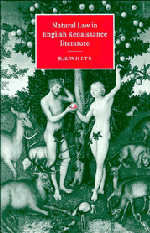Book contents
- Frontmatter
- Contents
- Preface
- Acknowledgments
- 1 Natural Law in history and Renaissance literature
- 2 The heritage of classical Natural Law
- 3 The reception of Natural Law in Renaissance England
- 4 Law and literature in sixteenth-century England
- 5 More's Utopia
- 6 ‘Love is the fulfilling of the law’: Arcadia and Love's Labour's Lost
- 7 ‘Hot temper leaps o'er a cold decree’: The Merchant of Venice and Measure for Measure
- 8 Shakespeare's The History of King Lear
- 9 Milton and Natural Law
- Epilogue: Hobbes and the Demise of classical Natural Law
- Appendix: Aquinas on the right to own private property
- Notes
- Select bibliography
- Index
3 - The reception of Natural Law in Renaissance England
Published online by Cambridge University Press: 17 September 2009
- Frontmatter
- Contents
- Preface
- Acknowledgments
- 1 Natural Law in history and Renaissance literature
- 2 The heritage of classical Natural Law
- 3 The reception of Natural Law in Renaissance England
- 4 Law and literature in sixteenth-century England
- 5 More's Utopia
- 6 ‘Love is the fulfilling of the law’: Arcadia and Love's Labour's Lost
- 7 ‘Hot temper leaps o'er a cold decree’: The Merchant of Venice and Measure for Measure
- 8 Shakespeare's The History of King Lear
- 9 Milton and Natural Law
- Epilogue: Hobbes and the Demise of classical Natural Law
- Appendix: Aquinas on the right to own private property
- Notes
- Select bibliography
- Index
Summary
Until the end of the seventeenth century the model of Natural Law was debated and contested in England throughout the system of law and politics. So radically ambivalent was the theory itself that it did not escape attention it held political implications, and could be appropriated by those of many different persuasions. The issue that was to become more and more crucial was whether reason and conscience are God-given faculties that lie within the human head and heart, able to be exercised in particular circumstances, or whether fallen man has lost touch with these faculties and needs to be coerced into obedience to the laws of the state, which were assumed axiomatically to be consistent with Natural Law if passed by the properly constituted authority. Those who believed in the political necessity of strong monarchy would argue for the latter, those who believed in the sanctity of individual or collective choice would rely on the former. Within this overarching conflict lay another political contestation over the credentials of ‘properly constituted authority’, which partly explains Shakespeare's giant family saga of history plays, where the right to succession is the crucial struggle. In the English Renaissance, this struggle was acted out not only politically, but also within legal institutions themselves, as conflicts between rival legal systems. All systems, however, made claims by appealing in greater or lesser degree to Natural Law. This was so even of the positive law system, an uneasy triumvirate of common law, equity, and parliamentary statute.
- Type
- Chapter
- Information
- Natural Law in English Renaissance Literature , pp. 44 - 71Publisher: Cambridge University PressPrint publication year: 1996

